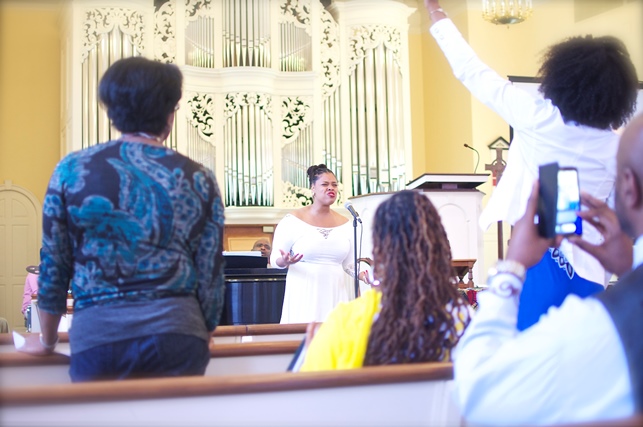Forming the Life of the Congregation Through Music
B. A practical way to elicit participation is through songs structurally designed for greatest involvement. Call-and-response songs consist of a leader singing a line which is imitated by the congregation. An advantage is that the people can join in immediately, simply by imitation.

Worship in the Princeton chapel, during the 2014 Black Theology and Leadership Institute.
Similarly, one can use simple songs that change only a few words with each verse. Soon and Very Soon by André Crouch needs only two new syllables each time around. The song lists griefs that will be absent when the Kingdom comes in full: no more crying there, no more dying there. Our church once did this song, but stopped between verses to ask for suggestion from the people. One child beset by troublesome food intolerances shouted, “No more allergies there!” The syllables were perhaps a little crowded, but no matter: we sang away. Then a dear woman with a physical disability cried out, “No more wheelchairs there!” These beautiful moments were possible because the people were drawn to participate.
C. Creating songs for underserved people is not only a way of inviting involvement, but also puts into practice Jesus’ command to honor those normally considered least important. Using music produced by the industry gives a privileged place to those who are most familiar with it: its customers. In my congregation we have some people who own collections of Christian music CDs in styles typical of the middle class, but others who do not know this music and cannot afford to buy it. If we sang only the music of the middle class, it would certainly send a message of marginalization to those in poverty: this is our music, not yours, because this is our church, not yours. When we call upon local creativity for new songs, the playing field is leveled and everyone is a beginner.
The full sound of the people is a compelling sign of the Spirit in our midst.
Conclusion
Making music together is delightful and demanding; problematic and pragmatic; mystical and mirthful. Christian leaders who understand the subtle inner workings of texts, inclusion, and culture will more ably guide their churches into richer ways of singing.
PR
Notes
1 Latin texts like the Credo have served in Christian worship for centuries and are arguably the kind I have just described as too direct and dry. A full consideration of historic worship texts is beyond the scope of this article and perhaps beyond the scope of the reader’s interest. It must suffice for now to suggest that the Credo is actually rather poetic by the standards of its time.
2 With the obvious exception of country music.
3 I am indebted to journalist Andy Crouch for these helpful terms.
4 Pastors who lament their congregations’ inertia might ask how they got that way.
5 It is also a common strategy to market themselves as “vulnerable.” (Vulnerability is really hot right now.) But no one is truly vulnerable with an unseen and distant customer base. Feigned vulnerability is the highest form of insincerity.
6 A person who guides a community by teaching them to respond emotionally rightly at the right time: how to celebrate, contemplate, and grieve. It is a pastoral role.
7 This description of the economic dynamics of the Christian music industry may offend some readers. I fully expect some emails about (or from) committed, faithful believers who undertake fruitful labor for the gospel within the industry. Of course there are such folk. I have met many, liked most, and played music with some. None of this ameliorates the underlying tensions and inconsistencies of an industry that has set out to make a profit—a very large profit—by selling us the experience of worshiping Jesus.
8 I have written elsewhere on the subject. Interested readers may visit http://people.cedarville.edu/employee/johnmortensen/works/writings.html [no longer accessible as of Nov 12, 2014, please see John Mortensen’s author page for information about his blog]
9 Recently a man in my church neighborhood asked for money so he could turn his cable television service back on; otherwise the children had nothing to do. He could not conceive of a family creating its own fun. Indeed, he could barely conceive of enjoyment at all without the entertainment industry. He is the archetypical man formed into consumer passivity.


